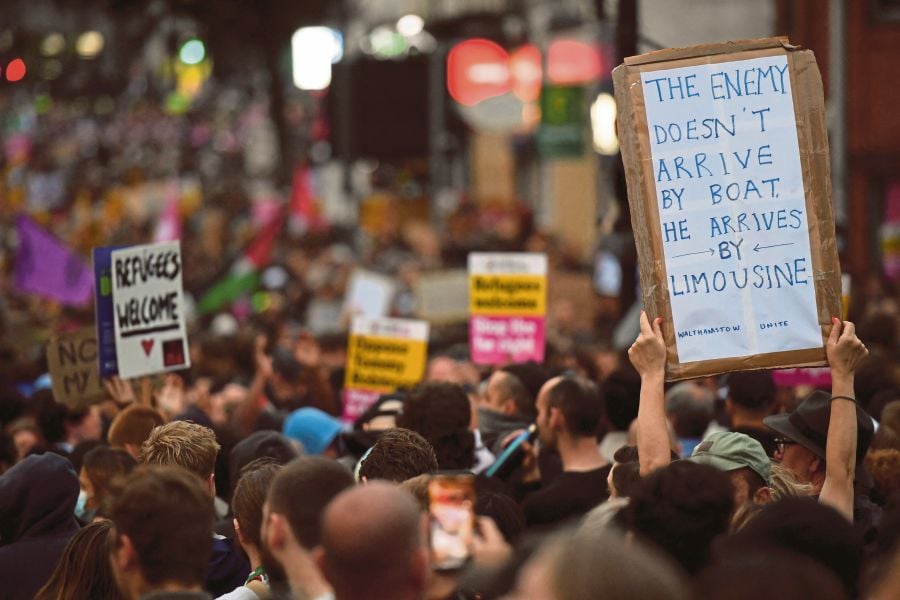
THE past week's ugly scenes of street violence, burning cars, looting and clashes between hooded, masked mobsters and the police have reignited memories of similar horrific events that took place in London, also in the month of August, 13 years ago.
In both instances, the unrest began in a single location but quickly escalated and spread to other cities across the country, driven by rumours, misinformation, and, to some extent, the hot weather that brought thousands onto the streets.
Social media and mobile phones played a significant role in the spread of these rumours during both tragic incidents, which were subsequently exploited by far-right movements and anarchists eager to incite violence and chaos.
The 2011 riots will be remembered — especially by Malaysians — for the tragic moment when a young Malaysian student was mugged and beaten by thugs attempting to steal his bicycle.
He became the unwitting hero of that sorrowful episode.
The current unrest, however, is rooted in a different tragedy: the decision to withhold the name and origin of an alleged knifeman because he is only 17 years old.
This confidentiality fuelled dangerous rumours that the person responsible for killing three children and injuring several others at a holiday club in Southport was a Muslim asylum seeker who had arrived on a small boat.
It didn't take long for tensions to boil over.
Even after it was confirmed that the alleged attacker was a Christian youth born in Cardiff, a mosque was attacked, hotels housing migrants were torched, and members of ethnic minorities were subjected to physical and verbal abuse.
The targets were surely immigrants who many locals perceive as people who came to rob them of their livelihoods and homes.
Messages circulating via WhatsApp and social media platforms have fuelled anger and instilled fear, all under the guise of spreading awareness.
Nearly every day, we receive lists of targeted towns and locations where gatherings are expected, urging us to avoid those areas.
Last Wednesday brought the most extensive list yet, with at least two locations alarmingly close to where I live.
Business centres were swiftly boarded up, and people were advised to work from home and steer clear of potentially volatile areas.
As a hijab-wearing individual, I am acutely aware of the risks associated with venturing near these trouble spots.
My experience after the July 7, 2005, attacks — when four Muslim suicide bombers targeted London's public transport — has taught me to be cautious.
While covering the aftermath at King's Cross tube station, a beer can was thrown at me, missing by mere inches.
Numerous Islamophobic incidents in London have since heightened my vigilance.
Unlike the 2011 riots, where the police and authorities were seen as the enemy by people of different colours and backgrounds, this summer's unrest targeted non-whites and immigrants.
In one video clip, mobs were seen stopping cars to check the driver's skin colour.
Anti-immigrant sentiment has reached alarming levels as mobs march, shouting slogans like "Enough is Enough" and "Britain for Britons".
When these groups encounter Muslims or other non-whites defending their places of worship, conflict inevitably ensues.
Islamophobic rhetoric is not confined to the streets; it echoes from the corridors of power.
A Tory leadership hopeful, Robert Jenrick, suggested that police should arrest anyone chanting: "Allahu Akbar".
Another is under investigation for using a threatening gesture aimed at Muslims.
Such developments have understandably led many to stay indoors.
A friend in Newcastle, Sofinee Harun, has not felt safe enough to go to work.
As a delivery driver who wears a niqab, Sofinee is all too aware of the risks of venturing into remote areas alone.
"What's happening now in the UK has really affected our daily lives. I've had to stop taking delivery jobs for my own safety.
"In the past 25 years, I've worked in many places across the northeast while wearing the niqab, and I've rarely had any problems."
POSTCARD FROM ZAHARAH
